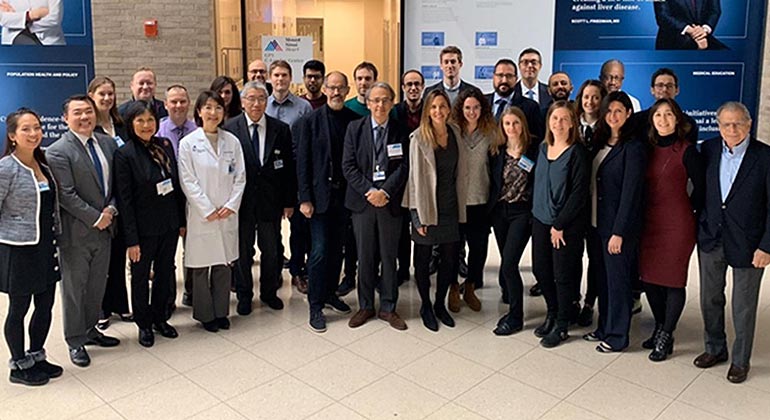About Us

State-of-the-art cancer treatment requires a team approach. At the Center of Excellence, our experts work together to provide you the best possible care. Our whole team meets weekly. We develop a personalized plan for you and monitor your progress during treatment and after. We use a variety of approaches to treat liver and bile duct cancers. Our main tools are surgery, organ transplants, interventional radiology, interventional oncology, radiation oncology, and medical oncology.
Surgery
When we find liver or bile duct cancer before it spreads, we can often cure it surgically. We can also use surgery to cure cancer that has spread (metastasized) to the liver from elsewhere in the body. Our team of liver surgeons includes both surgeons with training in liver transplantation, who use advanced transplant techniques (many of which were developed at Mount Sinai). It also encompasses surgical oncologists, who are trained to treat many different cancers including liver and bile duct tumors. Whenever possible, we use minimally invasive laparoscopic or robotic surgery. These approaches get you back on your feet more quickly and with fewer side effects than open procedures.
Liver Transplants
Liver cancer often develops after many years of cirrhosis and other liver damage. Often, the liver is not strong enough for us to remove part of it. Sometimes we can remove the entire liver and replace it with a healthy one. This is known as a liver transplant. Our liver transplant program is one of the busiest in the United States.
The national organ transplant list allocates healthy livers to people who need them. But there are more patients who need livers than there are healthy livers available. This can result in a long wait. Having liver cancer gives you priority on this list. But you may still have to wait a year or more.
Mount Sinai offers another approach, our living-donor program. This program lets us use part of the liver from a healthy relative or friend for the transplant. If you have a qualified and willing donor, this can dramatically shorten your wait.
Interventional Oncology
Patients with small tumors, and those who for some reason can’t have surgery, can often be treated successfully without surgery by our interventional oncology team. One approach is to insert a special needle into your liver tumor, guided by computed tomography scans. Then we send microwaves through the needle to heat the tumor and the surrounding tissue until it is dead.
Another approach is to kill tumors by cutting off their blood supply. To do this, we guide tiny plastic tubes under X-ray control into the blood vessel that feeds the cancer. Then we inject tiny particles that contain either chemotherapy (chemoembolization) or radioactive yttrium-90 (radioembolization). Mount Sinai is a leader in radioembolization procedures. We train doctors from around the country in performing this complex procedure.
Radiation Oncology
Radiation can be a powerful tool to destroy cancer cells. Irradiating the liver used to be dangerous, but advanced computerized guidance systems now allow us to destroy liver tumors safely without damaging the surrounding liver.
Our radiation oncology experts are highly skilled with this approach. In addition, we are a partner in the New York Proton Center (https://www.nyproton.com/). This center uses advanced proton beam radiation to destroy cancer, letting us treat even more patients with radiation.
Medical Oncology
Our medical oncology team uses medicines to treat cancer throughout the body. This is called systemic therapy. We use several types of systemic therapies to fight liver and bile duct cancers:
- Immunotherapy medicines that help your immune system recognize and destroy cancer
- Newer drugs that target cancer cells without touching healthy ones
- Traditional chemotherapy
We select the approach that is most helpful for your situation. In the past, doctors only used systemic therapy for advanced cancer. But we have found it is helpful for patients with early-stage cancer as well. Mount Sinai is leading the way in using immunotherapy before surgery to increase the chances of a cure.
Liver Medicine
If you’ve had liver disease for many years, it can develop into cancer. The most common liver diseases are hepatitis due to viruses, and fatty liver. Our liver medicine specialists (hepatologists) identify and treat liver diseases and monitor you for early-stage cancer. We test liver patients for cancer every six months. That way, if you develop a liver cancer, we can start treatment as early as possible. This gives you the best chance at a cure. If you need a liver transplant, we can help you from your first consult until you are back to normal life.
Supportive Care
We understand how challenging it is to have a diagnosis of liver or bile duct cancer. Our supportive oncology experts can help you and your family cope with the symptoms of cancer and the side effects of treatment. We can also ease emotional and spiritual distress and support family caregivers.
Community Outreach
Mount Sinai is committed to reaching out to populations at risk for liver disease and cancer. We have created the Hepatitis Outreach Network (HONE)—working with New York City-area community leaders—to provide education and screening, and connect patients to care. Since 2009, HONE has worked with more than 50 community-based partners including the New York City Department of Health and Mental Hygiene, African Community Services, and the Charles B. Wang Community Health Center.
Education
We are committed to training the next generation of liver cancer doctors and researchers. More than 100 doctors from around the world have visited with us over the past 10 years to learn how we take care of people with liver and bile duct cancers. We also train medical students, residents, and fellows. Through our Liver Cancer Fellowship Program, more than 100 doctors from around the world have visited our liver cancer program. They learn all aspects of liver cancer management and research.
